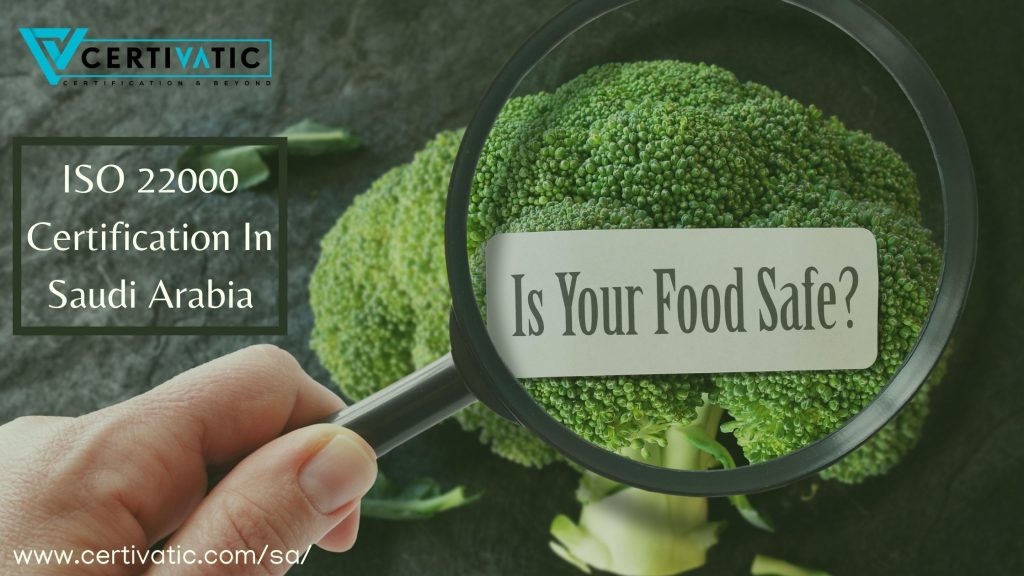How To Get ISO 22000 Certification In Saudi Arabia


In Saudi Arabia, food safety is a serious issue. The majority of foods entering Saudi Arabia are subjected to rigorous inspection. Manufacturers and distributors must conform to several requirements to sell their products in the Middle East market. Applying for ISO 22000 certification in Saudi Arabia can be highly beneficial to people in the food industry.
WHAT IS ISO 22000 CERTIFICATION?
The International Organization for Standardization (ISO) produces the ISO 22000 standard, which assists enterprises in the food supply chain in establishing and implementing a Food Safety Management System. ISO 22000 combines ISO 9001’s quality management element with HACCP’s safety management factor to assure food safety and quality at all levels, from farm to fork! It assists companies in recognizing risks and developing corrective action plans to avoid or mitigate them. Food safety is a global concern, and nations worldwide have enacted strict rules to ensure that food is safe and of the highest quality for eating. The ISO 22000 certification in Saudi Arabia demonstrates an organization’s commitment to providing safe food that does not cause illness or injury. Any firm, large or small, can apply for ISO 22000 certification In Saudi Arabia if they are involved in any stage of the food chain, such as manufacturing, distribution, or even retail.
HOW DOES IT WORK? WHICH BENEFITS DOES ISO 22000 CERTIFICATION PROVIDE?
Organizations in Saudi Arabia can benefit from ISO 22000 certification in the following ways:
- Internal communication has improved, and processes have been better managed.
- It is a warranty that the product is of good quality, safe, and dependable.
- It lowers the expenditures that might otherwise be incurred as a result of product recalls.
- Increased brand loyalty and a big boost to your market image.
- Increased trust in disclosures foodborne illness prevention.
- Resource management that is efficient.Employee morale is boosted.
- They are quickly and effectively addressing food safety concerns.
- Prerequisite programs are managed in a systematic manner.
- Decision-making that works
WHAT ARE THE REQUIREMENTS OF ISO 22000 CERTIFICATION?
Some mandatory requirements for implementing the Food Safety Management System (FSMS) in an organization may be found in Annex SL of the ISO 22000 standard’s High-Level Structure. The following are sections 4 through 10 of the Annex SL document. On the other hand, the first three sections primarily introduce the standard and include scope, normative references, and terms and definitions. In the following seven parts, the exact criteria for FSMS are discussed.
- Section 4: Organizational Context– This section covers all of the aspects that may impact your company. They might be external or internal, and they can influence those affected, such as consumers, clients, contractors, stakeholders, and so on.
- Section 5: Leadership– This section discusses top management’s role in ensuring the organization’s FSMS is effective. In addition, it promotes the assignment of duties in a transparent manner and the facilitation of accessible communication.
- Section 6: Planning — This section focuses on identifying hazards on time and developing action plans to address them.
- Section 7: Support– The organization is informed about the tools, technology, and resources needed to adopt FSMS.
- Section 8: Operation – This section addresses the evaluation of current procedures as well as legal compliance. The most basic necessity is to conduct risk assessments regularly.
- Section 9: Performance evaluation– Your FSMS’s effectiveness can be tested and reviewed on a regular basis. This ensures that your management system is capable of achieving the goals set by your company.
- Segment 10: Improvement– This section ensures that your firm is equipped to satisfy changing market demands by continuously upgrading the management system.
HOW DO I GET ISO 22000 CERTIFICATION, AND WHAT DOES IT MEAN?
If your company is headquartered in Saudi Arabia, this section will show you how to achieve ISO 22000 certification in Riyadh. After you’ve created your FSMS, you’ll need to put it in place for a while and record the process before inviting a certifying body for ISO 22000 certification In Saudi Arabia . You’ll have to fill out an application form that includes information about your company. Your application form will be reviewed by the certification body of your choosing, who will then supply you with a quote, after which you can schedule your certification audit.
Various stages must be completed to achieve ISO 22000 certification. After you’ve taken care of the paperwork, you’ll need to complete the processes outlined below to get certified:
Internal audit: This is the initial step in verifying your documents and is carried out by an internal auditor.
management audit:Throughout this stage, your management will assess the gaps and determine the practical realities of your firm.
Corrective actions: Gaps discovered during internal audit and management review must be filled by implementing specific disciplinary actions. All of the remedial activities that were done to close the gaps should be appropriately documented.
The ISO 22000 certification procedure is divided into two stages:
Stage one (documentation survey) – Reviewers from the certification authority of your choice will check your documents against the ISO 22000 standard’s requirements.
Stage two (Primary audit) – The ISO 22000 certification requirements are used to assess the conformance of your paperwork. This is performed by examining reports, records, and company procedures in detail
For More Information: ISO 22000 Certification in Saudi Arabia

